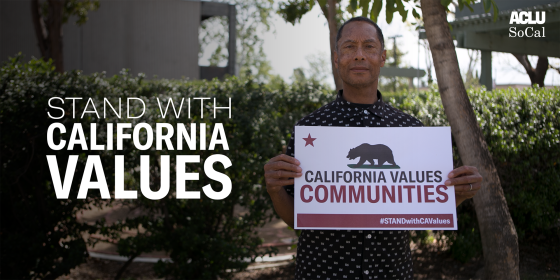Officers No Longer Permitted to Report People Based on Suspected Immigration Status
LOS ANGELES — The Union Pacific Railroad Police has agreed to break off its shadowy collaboration with U.S. Immigration and Customs Enforcement (ICE) that was rooted in racial profiling and other actions causing the harm that the California Values Act was enacted to prevent.
The key changes in the policies of the UP police — which has been patrolling railroad property since the mid-1800s — came after a demand letter was submitted to the organization by a coalition of civil liberties and immigrant rights groups. The letter, sent on March 20, 2019, charged that the railroad police had unconstitutionally stopped, arrested, and detained individuals based on their race or ethnicity, and then transferred them to ICE.
And today, a settlement was filed in U.S. District Court in Los Angeles of a lawsuit claiming ICE did not turn over documents regarding its secretive relationship with the railroad police in response to a Freedom of Information Act (FOIA) request. After the lawsuit was filed, ICE produced more than 250 pages of records regarding arrests made by the UP police in collaboration with ICE.
In the settlement, ICE agrees to pay $15,000 in fees, and the lawsuit is dismissed.
“UP’s collaboration with ICE threatened immigrant families and was inconsistent with the California Values Act,” said Jessica Bansal, senior staff attorney with the American Civil Liberties Union Foundation of Southern California. “We are pleased the new policy cuts ties with ICE and will be monitoring closely to ensure the troubling practices revealed by the FOIA litigation do not return.”
The demand letter to the railroad police pointed out that the officers’ actions — often rooted in racial profiling in violation of constitutional rights — separated families, harmed communities, and in some cases preyed upon people who were homeless. Individuals arrested by the railroad officers were often held beyond the time they would have otherwise been released just so they could be picked up by ICE — a violation of the Fourth Amendment to the U.S. Constitution.
Several examples of unlawful detentions were detailed in the letter, a man who was riding his bicycle home from work along the San Gabriel River Trail, and several homeless individuals, including a woman suffering from mental health issues.
The new policy prohibits officers from:
- Using suspected immigration status as a factor in determining whether to confront, detain, or arrest a person.
- Asking about immigration status.
- Ordering a person to produce immigration documents.
- Initiating contact with a federal immigration agency to report a person.
The new policy also says that the railroad police “shall decline to participate in any joint law enforcement task force the sole purpose of which is to identify, detain, or deport” people who are undocumented.
Additionally, the new policy says the railroad police “should not act on immigration-related federal agency detainers or similar requests not signed by a federal judge.”
The demand letter sent last year to the UP police was from a coalition that included the ACLU SoCal, Black Butte Center for Railroad Culture, Coalition for Humane Immigrant Rights of Los Angeles, Clergy and Laity United for Economic Justice, Bend the Arc Jewish Action, Palestinian Youth Movement, and El Centro Cultural de Mexico.
The lawsuit against ICE was filed on behalf of the Immigrant Defenders Law Center, the Western State College of Law Immigration Clinic, Public Counsel, and the Esperanza Immigrant Rights Project.
“Our clients’ lives were upended by UP’s unlawful entanglement with ICE,” said Talia Inlender, supervising senior staff attorney at Public Counsel. “No other immigrant should be torn away from their community based on racial profiling.”
Read the Union Pacific Railroad policy on “Immigration Status” here: aclusocal.org/sites/default/files/union_pacific_railroad_police_general_order_immigration_status.pdf
Read the settlement agreement with ICE here: aclusocal.org/sites/default/files/aclu_socal_union_pacific_20200721_settlement_agreement.pdf
###




